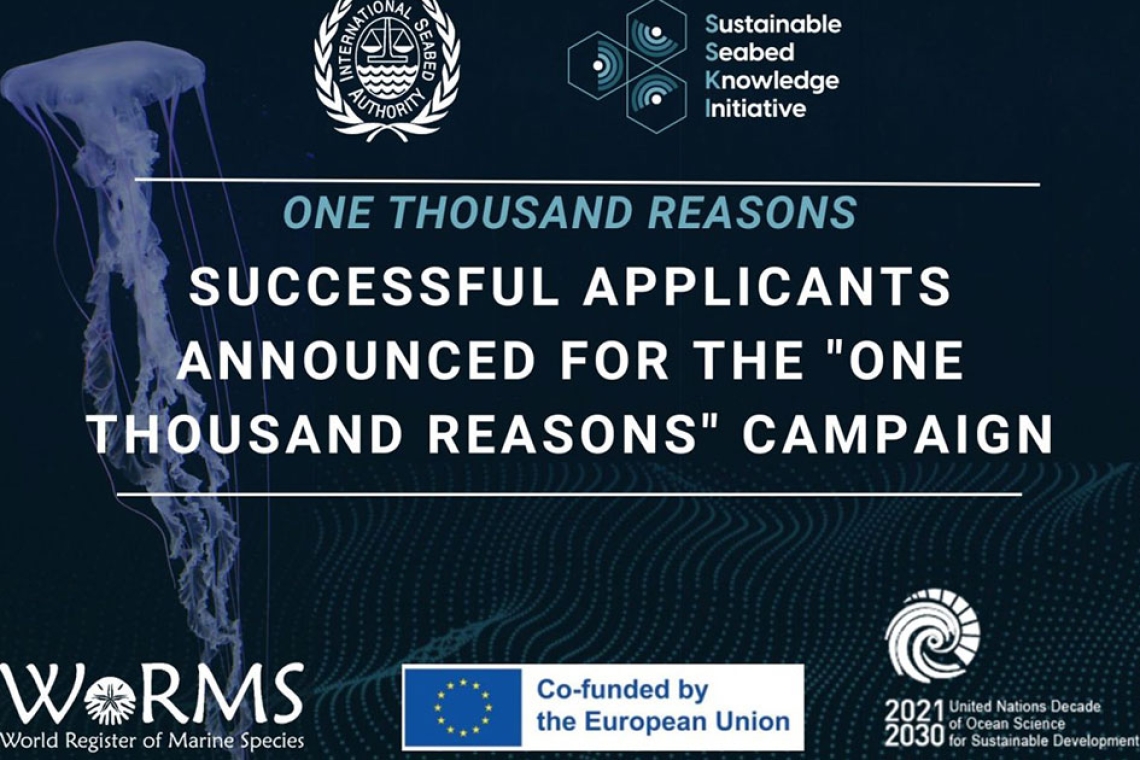Successful Applicants Announced for the “One Thousand Reasons” Campaign

In a major stride towards understanding the mysteries of our oceans, the International Seabed Authority (ISA), in collaboration with the World Register of Marine Species (WoRMS) and supported by the European Union, is excited to announce the successful applicants for the groundbreaking “One Thousand Reasons” campaign. The response was unprecedented, with 65 applications from 21 countries among all five regional groups of ISA Members and one country with observer status. This initiative signifies a monumental effort to describe at least one thousand new deep-sea species by 2030, enhancing our collective knowledge of life in areas beyond national jurisdiction.
The projects selected are:
- Dr. Aaron Evans and Dr. Jesse Kelly (Citizen Scientists): Collaborating with renowned institutions, including the Monterey Bay Aquarium Research Institute, the National Museum of New Zealand Te Papa Tongarewa and the Natural History Museum of the United Kingdom, among others, these experts stand poised to make significant contributions to our understanding of deep-sea squids.
- Dr. Jeremy Horowitz (Smithsonian Institution, National Museum of Natural History): Renowned for its scientific expertise, the Smithsonian Institution will spearhead a taxonomy project on black corals led by Dr. Horowitz.
- Dr. Magdalini Christodoulou (The Biology Center of the Upper Austria Landes-Kultur GmbH): Working in conjunction with the German Center for Marine Biodiversity Research, Dr. Christodoulou focus will be on unearthing new sea star species in the uncharted depths of the ocean.
- Dr. Anna Jażdżewska (University of Łódź): Collaborating with the German Center of Marine Biodiversity Research Institute, Dr. Jażdżewska will leverage expertise in deep-sea amphipod taxonomy.
- Dr. Swee Lim (National University of Singapore): Teaming up with the Natural History Museum, London, and the Lee Kong Chian Natural History Museum, Singapore, the project led by Dr. Lim promises to be a fusion of global expertise in sponge taxonomy.
- Dr. Tim O’Hara (Museums Victoria): In collaboration with the Natural History Museum, London, and the Natural History Museum of Luxembourg, Dr. O’Hara’s project offers a unique blend of multidisciplinary perspectives on brittle-star taxonomy and evolution.
- Dr. Nuria Sanchez (University Complutense of Madrid): Partnering with the Senckenberg Society for Nature Research, Germany, Dr. Sanchez will explore the less-known Kinorhyncha and Loricifera species.
- Dr. Sarah Viana (University of Cape Town): Working alongside Stellenbosch University and Iziko Museums of South Africa, Dr. Viana is set to bring new insights into deep-sea sharks from the Southern Hemisphere.
- Dr. Yadong Zhou (The Second Institute of Oceanography, Ministry of Natural Resources): Embarking on this venture, the project led by Dr. Zhou will expand our scientific horizon on deep-sea Echinoderms and Polychaetes.
These successful projects were selected based on their scientific merit, potential impact and feasibility at the forefront of a quest to describe nearly 100 new species by the end of 2024. Each project has received financial support of up to $20,000 covering laboratory analysis, data processing, personnel remuneration and more. The results will be published in open-access scientific journals and incorporated into the ISA’s Deep Data and WoRMS databases.
“The ISA Secretariat is proud to foster a global collaborative platform through the Sustainable Seabed Knowledge Initiative, emphasizing the importance of deep-sea biodiversity research in informing decision-making processes for the effective protection of our marine environment,” said the Secretary-General of ISA, H.E. Mr. Michael W. Lodge.
“As we embark on this remarkable journey, ISA reaffirms its commitment to generating transformative actions and long-standing legacy in deep ocean sciences. The discoveries made through these initiatives and the network of institutions involved will not only enrich our understanding of the deep sea but also ensure its sustainable management and conservation for future generations,” he added.
For more information about the “One Thousand Reasons” campaign and the Sustainable Seabed Knowledge Initiative, please visit the ISA website.

